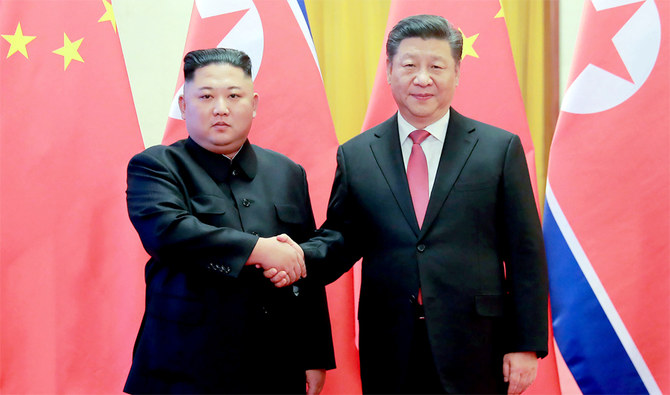SEOUL: Chinese President Xi Jinping is to start a two-day state visit to Pyongyang on Thursday to meet with North Korean leader Kim Jong Un ahead of next week’s G20 Summit in Japan.
It will be the first official visit by a Chinese leader to Pyongyang in 14 years. Xi’s visit, which comes at Kim’s invitation, takes place as China and North Korea lock horns with the US over trade and nuclear issues, respectively.
“Xi is expected to show off his strong influence over the Kim Jong Un regime, which is in a tug of war with the Trump administration over denuclearization and sanctions,” Moon Sung Mook, a researcher in Seoul, told Arab News.
“But I don’t think the Xi-Kim meeting will provide a clue as to the stalled nuclear disarmament talks between Pyongyang and Washington.” Moon, a retired brigadier general, said Xi will likely support Kim’s stance on phased denuclearization efforts in return for incentives from the US.
“China has long sided with North Korea’s assertions about a step-by-step denuclearization process and the halting of joint military exercises by the American and South Korean armed forces,” said Moon.
“They’ve been quite successful as the joint exercises have been suspended, and I don’t believe Xi will add pressure on the North over sanctions,” he added.
“For Kim, Xi’s visit will help ease his diplomatic crunch after the collapse of his (Kim’s) summit with US President Donald Trump in Hanoi in February.”
That summit broke down due to disagreements over how far North Korea should go in dismantling its nuclear programs in return for sanctions relief.
FASTFACT
Washington has demanded that the North make a verifiable effort to get rid of all its nuclear weapons, including its enriched uranium program, before any sanctions are lifted.
Washington has demanded that the North make a verifiable effort to get rid of all its nuclear weapons, including its enriched uranium program, before any sanctions are lifted.
In defiance of UN resolutions, North Korea has test-fired short-range multiple ballistic missiles over the eastern waters of the Korean Peninsula, further complicating the denuclearization talks.
But Pyongyang stopped short of firing intercontinental ballistic missiles, a red line drawn by the Trump administration.
Prof. Kim Dong Yub of Kyungnam University’s Institute for Far Eastern Studies said the North Korean leader is “using diplomatic leverage to deal with the US … in the face of US-led sanctions.”
He added: “For Xi, the North’s denuclearization won’t be a major issue among his agenda items as his country is locked in a standoff with Trump over trade and technology.”
He said: “Given the escalating trade war between Beijing and Washington, Xi’s trip to Pyongyang is obviously an important geopolitical move.” Beijing has yet to confirm whether Xi will meet with Trump during the G20 Summit.
Meanwhile, South Korea’s presidential spokeswoman Ko Min Jung said: “We expect this (Xi’s) visit to contribute to the early resumption of talks for complete denuclearization and a permanent peace settlement on the Korean Peninsula.”
Trump recently said he had received another “beautiful” letter from the North Korean leader, opening the door for his third summit with him.


























